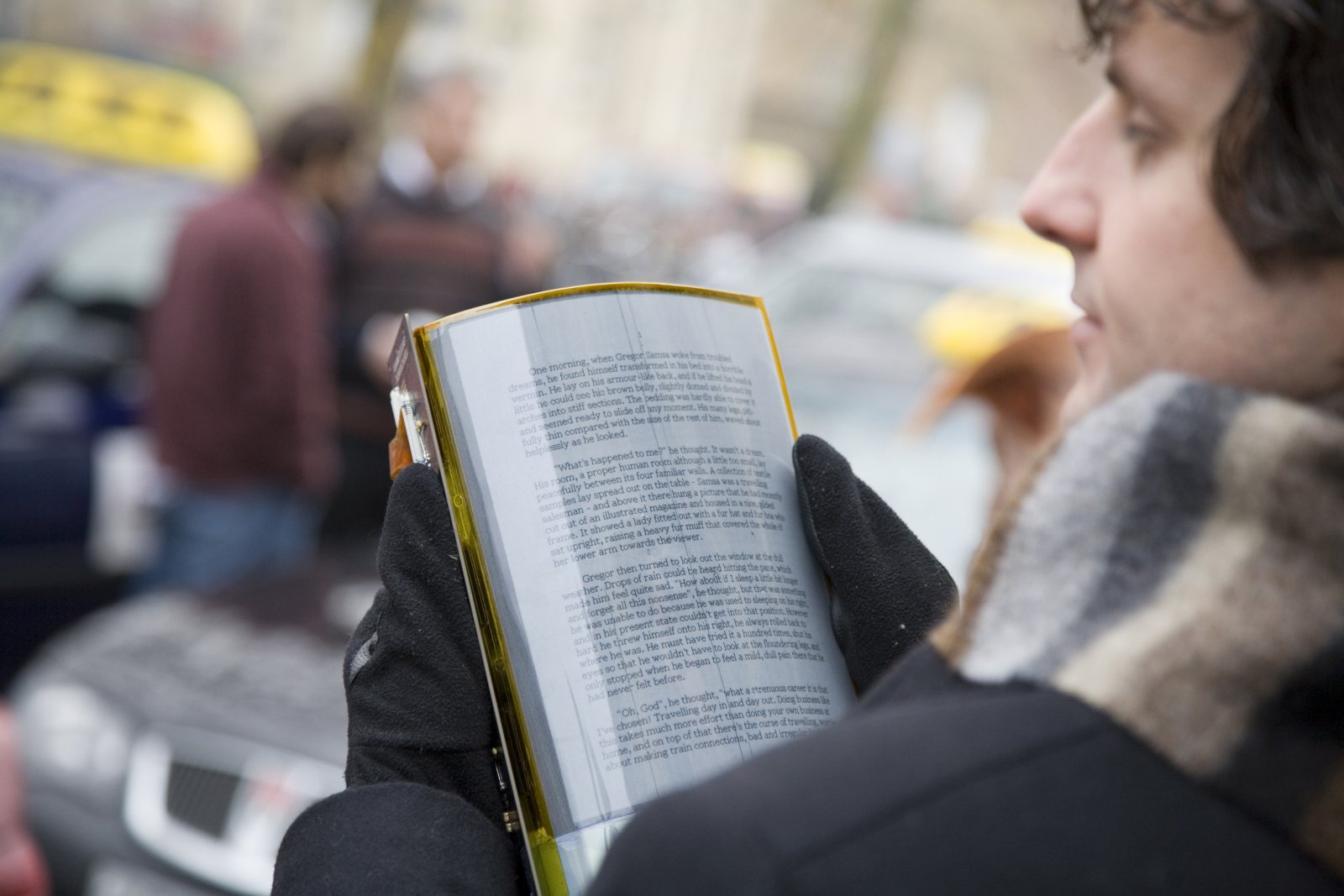Tech Update - E-Books and E-Readers
Interview with
Meera Senthillingham - Yes, I am at the BBC television centre in White City in London with our tech expert Chris Vallance. How are you Chris?
Chris Vallance - I am fine, although the sun seems to have disappeared today, doesn't it? After such a lovely week and then we sat outside and it's actually grey and miserable but there we go, that's British summers for you...
 Meera Senthillingham - Well, other than the horrible weather what have you got lined up for us in terms of technology this month?
Meera Senthillingham - Well, other than the horrible weather what have you got lined up for us in terms of technology this month?
Chris Vallance - Well, when the weather closes in there's nothing better than to curl up with a good book. Of course there has been lot of tech excitement around the launch of the latest version of Amazon's E-book reader with a bigger screen.
Lot of excitement about whether e-books are one of the ways forward for publishing and it's not just Amazon that are in there, there are number of other companies vying for this space. We got Sony. We are even expecting a couple of British entrants into the market; two E-book Readers due out maybe later in the year, one from a company called Cool-er and the other one from a company called Plastic Logic which I believe that technology has been featured on the Naked Scientists before, so a lot of excitement in this space.
Publishing and technology have been well developing hand-in-hand for a while now. A lot of publishers are starting to get into social media in a really big way. as a way of marketing books, as a way of engaging with fans, things like YouTube, Twitter, Blogging, all of that publishers are starting to embrace.
I have been speaking to one of the guys, if you like, 'leading the charge' into this field in the publishing industry. His name is Jeremy Ettinghausen and he is the digital publisher at Penguin Books.
Jeremy Ettinghausen - For some authors blogging and going on Twitter and making videos on YouTube has given them routes to get closer to their audience and engage readers outside the very specific work of their book.
Chris Vallance - For those authors that do engage in it, what's in it for them?
Jeremy Etthinghausen - It allows them to tell the readers where they are going to be if they are doing events, tell them news about publishing events, when their new book's coming out, special offers, that sort of things but it allows the reader to get closer to the author and that in terms of pure kind of commercial things can't help but sell more books.(34:10).
So 'We tell stories' was the project where we paired up authors and game designers. We had six stories running over six weeks, the first one was told on Google Maps and you could follow the character as he explored England and had several adventures.
The last story was by Mohsin Hamid who was short-listed for the Booker Prize last year and he made a very elegant take on a choose-your-own-adventure story and the idea of you know, very literary, prize-winning author creating a kind of detailed schematic for the structure of a choose-your-own-adventure story was absolutely thrilling.
 Chris Vallance - And that was Jeremy Ettinghausen talking about how social media is important for publishers.
Chris Vallance - And that was Jeremy Ettinghausen talking about how social media is important for publishers.
Meera Senthillingham - Now what about the authors involved in this technology?
Chris Vallance - Well, it's fair to say not all authors are interested in this at all but I have been speaking to one, he uses Twitter quite a lot to engage with fans and to talk about his work. His name is Nick Harkaway and he is the author of the book 'Gone away world'.
Nick Harkaway - The wonderful thing about Twitter is not only is it a kind of level playing field where your reader is confined to you and you can talk to them and you don't have to worry about this concept of the 'fan', you can just be people talking about stuff that you like but you can also find authors and you can track down people you admire and say 'I really like you', and then feel very embarrassed about it afterwards but it works very well.
I think the really important thing is to be genuine. There are lot of people on social networking sites and Twitter in particular who have that publicist kind of Twitting for them every second and its very obvious and it's slightly disappointing. You can't just kind of implant the idea that they must go and buy your book in someone's head, like an alien egg, you just leave there; it will hatch and you get sort of two pounds nienty nine or whatever your royalty is. You have to be there and engage in the discussion and that's probably the most important thing.
Chris Vallance - And it's not limited by genre?
Nick Harkaway - Ben Ocre-twitted a poem line-by-line the other day and P.D. Smith who wrote 'Doomsday men' - fantastic book, is constantly Twittering. You find everybody. Susan Hill has a weblog, it's all sorts.
Chris Vallance - Are there any dangers?
Nick Harkaway - Yes, that you spend too much time and have too much fun, other than that I think it's no more dangerous than taking a bus.
Chris Vallance - That was author Nick Harkaway. So we got two developments - one, the hardware, the advent of e-books and the other in the way in which you engage with your favourite writers, that you might be able to chat them on Twitter. You don't have to write a letter to the publisher anymore.
Meera Senthillingham - Now what are your thoughts on this Chris, how popular do you think e-books will become?
Chris Vallance - I don't know. There's something about the experience of having a book that's unique to the physical product, the feel of the book, the way it's published, the cover and all of that and let's face it, you don't want to start reading your e-book in the bath and books are kind of - the fact that they're slightly disposable and get dog eared, that's kind of part of the fun of a book, isn't it?
But on the other hand books do take up a lot of space. I mean in my own home practically every surface is covered with books. It would be a lot nicer if I could just reduce it down into an electronic format. So I guess there are pros and cons.
I think what's interesting is the way that technology is trying to replicate some of that physical experience of having a book, the screens on these devices are reflective they're not luminous. They feel more like paper they're useing this e-ink technology.
I think the really interesting thing would be how these devices effect sales of publications and newspapers. Obviously that's the magazines and newspapers are having a difficult time of it at the moment. Will reading them on e-books help rejuvenate that industry? I think a lots of interesting questions. I don't know the answer to your question, very long way of saying that. I don't know whether they will replace existing books. My guess is probably not.
Helen Scales - So E-books may not replace genuine old-fashioned books but they will certainly save us some space around the house and it's great the authors can now interact with their readers, gives me something to think about as well because my first book is coming out later this year.
That was Chris Vallance talking to Meera Senthillingham about the latest technology in the field of electronic books or e-books.
Chris Smith - I don't think that these electronic formats are quite as tangible. They are not as nice as the paper book. I just can't feel I can bond with them the same way as I can with...
Helen Scales - No, you can't, and you need them on your shelves and I think, yeah you say, Amazon never got rid of bookstores still. I mean they are obviously going through problems at the moment but economic problems at the moment but we still love to go and browse on bookshops, don't we? There's a certain feel and smell about it that we all love.
Chris Smith - Absolutely. This is the Naked Scientist with Chris Smith, with Dave Ansell and with Helen Scales. It's our science pone-in show. If you have any science questions for us then do drop us a line. It's 0845 30 50 007 on the phone, our text number 07786 20 1960 - the email address for the program as ever - Chris@thenakedscientists.com.










Comments
Add a comment